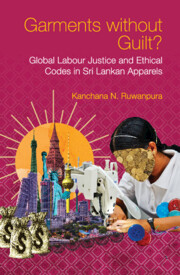Book contents
- Frontmatter
- Dedication
- Epigraph
- Contents
- List of Tables, Figures and Images
- Preface and Acknowledgements
- Published Works and Funding
- List of Abbreviations
- 1 Introduction: Global Labour Justice via Ethical Codes?
- 2 Labouring for Apparels: Labour Geographies and Feminist Inflections
- 3 Fieldwork: Prolonged Phases and Multiple Moments
- 4 Clothing the World – Guilt Free? Sri Lanka’s Apparel Landscape
- 5 Neglected Labour Histories: The Sri Lankan State Responds to Labour
- 6 Ethicality with a Blind Eye? Ethical Code Practices at Production Sites
- 7 From War to Work: Ethicality amidst Post-War Trauma?
- 8 Concluding Thoughts: Grounded Governance?
- Appendix
- References
- Index
1 - Introduction: Global Labour Justice via Ethical Codes?
Published online by Cambridge University Press: 15 December 2021
- Frontmatter
- Dedication
- Epigraph
- Contents
- List of Tables, Figures and Images
- Preface and Acknowledgements
- Published Works and Funding
- List of Abbreviations
- 1 Introduction: Global Labour Justice via Ethical Codes?
- 2 Labouring for Apparels: Labour Geographies and Feminist Inflections
- 3 Fieldwork: Prolonged Phases and Multiple Moments
- 4 Clothing the World – Guilt Free? Sri Lanka’s Apparel Landscape
- 5 Neglected Labour Histories: The Sri Lankan State Responds to Labour
- 6 Ethicality with a Blind Eye? Ethical Code Practices at Production Sites
- 7 From War to Work: Ethicality amidst Post-War Trauma?
- 8 Concluding Thoughts: Grounded Governance?
- Appendix
- References
- Index
Summary
Lovingly, to you
With a big burden in your heart
You smile, ignoring tears and hardships in life
Striving in the factory to attain prosperity for it;
You are a courageous Lankan woman serving the country.
Your heart fills with love for your children always
Daily, you try to provide for your sons
With nimble hands, you stitch clothes
This factory runs with your courage.
Weaving clothes using various patterns
You enhance the looks of beautiful women
For bringing in foreign exchange to Sri Lanka
You are appreciated this way.
—Anu2008: Global and Local Significance
The year 2008: A benchmark globally and, as it turned out, for distinctly local reasons, for Sri Lanka too. Months after I received news of success with my grant application to enable me to explore how Sri Lankan apparels are at the vanguard of ethical code governance, the world went into a global economic meltdown. This put pressure on apparel producers worldwide, including those in Sri Lanka. Local issues also had an impact on Sri Lanka's apparel sector. The Rajapaksa government had started its steady onslaught to end a protracted ethnic conflict and, by May 2009, through a bloody and gory military war, three decades of violence in the country ostensibly ended. What might these shifts mean for the Sri Lankan apparel sector's trademark Garments without Guilt (GWG)? Anu's poem, which I collected during my fieldwork in 2009, is also a reminder to ask: What about labour?
Around 2006, Sri Lanka's Joint Apparel Association Forum (JAAF) members envisioned GWG as a labelling strategy by which garments produced in the country were to carry a brand label and tag. Although the labelling objective was eventually recognized as unrealistic, GWG offered an effective platform to promote the Sri Lankan apparel sector as a safe place for retailers wanting to conduct their business ethically. Under the aegis of the JAAF, the Sri Lankan apparel sector was branded, packaged and promoted as a niche and ethical producer, which also created added value (Gunawardana 2007; Kelegama 2009; Athukorala and Ekanayake 2018).
- Type
- Chapter
- Information
- Garments without Guilt?Global Labour Justice and Ethical Codes in Sri Lankan Apparels, pp. 1 - 12Publisher: Cambridge University PressPrint publication year: 2022



